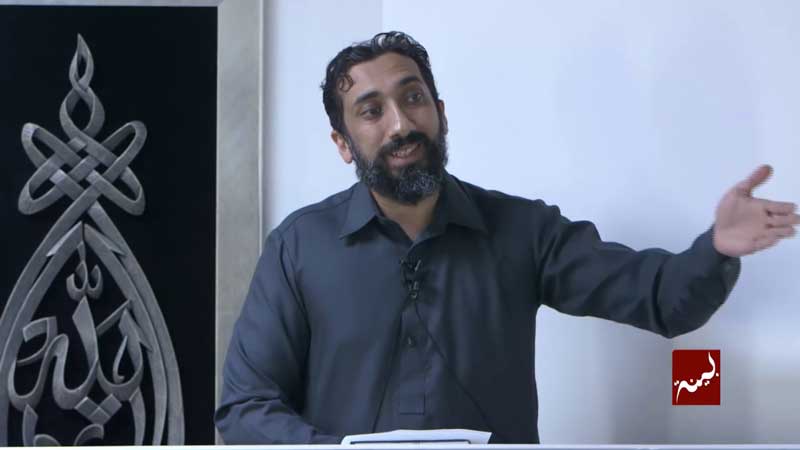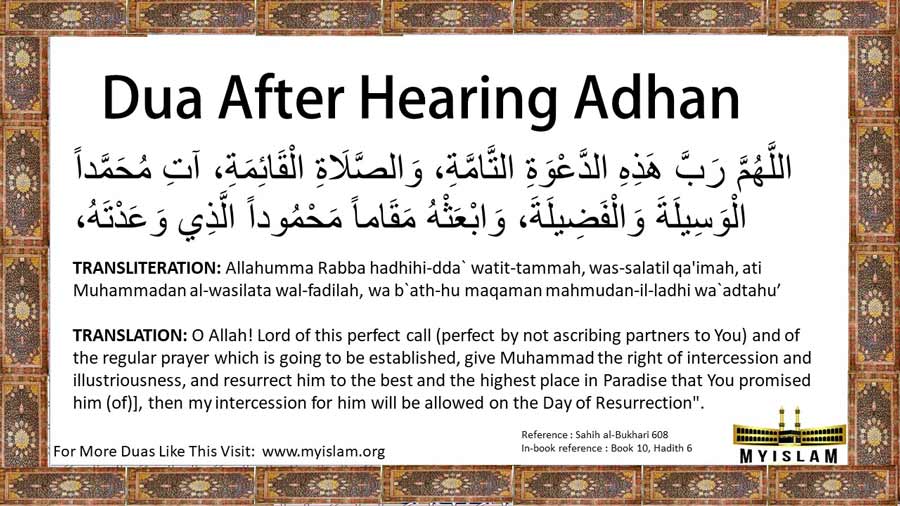Transcription of Video:
When Allah Azzawajal describes the fundamental truth in the Surah, that all human beings are drowning in loss, that means, what they say in technology terms; the default position, the natural position for all human beings is actually to be in loss. We are not naturally successful; we are naturally failures. We’re actually naturally succumb to failure. I don’t just mean failure in the worldly sense, I don’t just mean failure in the monetary sense. Emotionally, you’re going to be a failure. Spiritually, you’re going to be a failure. In your goals and aspirations, you’re going to be a failure. In this life, you’ll be a failure. In the next life, you’ll be a failure, if you don’t meet the criteria of the exception. Allah Azzawajal gave us a profound exception in this Surah.
First, He said: إِنَّ الْإِنسَانَ لَفِي خُسْر What I wanted to highlight first is, when Allah said, إِنَّ الْإِنسَان, انسان is a singular word, which means Allah is describing every person as if they’re on their own. Right now, we’re sitting among hundreds and there are crowds of thousands listening online or whatever, but every one of us is actually being spoken to as if there’s no one in the world, but you. There’s a conversation just between you and Allah. No one else matters, nobody else’s opinion matters, nobody else’s delusion matters, even the lies you tell yourself, they don’t matter. All that matters is now the reality that somebody can fake it, they can look at themselves in the mirror and tell themselves a story about themselves, but that story doesn’t matter. The reality is that you and I are in a state of loss.
The only exception to that are people who meet four conditions at the same time:
إِلَّا الَّذِينَ آمَنُوا وَعَمِلُوا الصَّالِحَاتِ وَتَوَاصَوْا بِالْحَقِّ وَتَوَاصَوْا بِالصَّبْرِ
The first thing briefly I want to tell you is that, that means that it’s not enough for us to meet one of these conditions, you have to and I have to meet all four of these conditions. You and I will not know whether we’re meeting these conditions or not, unless we actually only truly ask ourselves. Other than that, there’s only and only loss. The first of these conditions is that we have to have faith: إِلَّا الَّذِينَ آمَنُوا ”Except those who believed.’’ It’s remarkable that the Surah began with an individual person being in loss. The exception should have been, every human being is in loss, except the one who believed, but He says, except those who believed.
In other words, we went from the individual to the plural, to the group. Why? Because we’re learning something about what is it that you get from the other people around you. Allah created human beings to be social, we live in family, we live in society, we live in community and we interact with other people. We cannot survive on our own. We have to do business with others, we need doctors for medical help, we need teachers for education, we need police officers for security, we need each other in all matters in life; in business, in trade. We exchange benefits and give benefits to others, give and take all the time.
Allah is teaching us something profound, of all the things you receive from people and all the things you give to people, the most important thing that you can receive and the most important thing you can give, is actually a reinforcement of your faith; those who believed, in other words. The most valuable people in your life, the most important people in your life are not the people who are financially supporting you, they’re not the people that are making you feel better. The most important people in your life are the ones that keep you on your faith, the ones that reinforce your faith, those are the assets of your life.
Then He says: وَعَمِلُوا الصَّالِحَات ‘’And they did good things.’’ I won’t even go into the deeper language interpretation of وَعَمِلُوا الصَّالِحَات I’ll keep it brief. Again, who are the most important people in our lives? The people that when we’re around them, it’s easier for us to do good things, based on our faith. Those two things are logical progression. So let me just briefly explain what that means, what does it mean to have a logical progression in simple English.
Every person has some idea of what it means to do good. They have their own concept of good and evil. As a matter of fact, sometimes our definitions can be very different. It could be that, a non-Muslim or somebody else who doesn’t really know about your faith, says, ”Well, in my opinion, here’s how you should raise a child”, and they have a certain opinion of how you should raise a child. You compare that to somebody who has faith and say, ”No, I wouldn’t teach this and this and this to my child, I completely disagree with you.” In other words, they both think they’re doing good to their child, but they have very different definitions, don’t they? They look at reality very, very differently.
What we’re learning here, is that when you have faith, when you really truly have faith, then your definition of what is good and what is bad, what does it mean to do good deeds, doesn’t come from your opinion anymore. It actually comes from your faith. You let Allah decide what is good and what is bad, regardless of your own feelings. Even if you feel like it’s not comfortable for you, when you know something is good, you’ll do it anyway, once you truly understand what is it that Allah is saying though.
That is a disclaimer. A lot of times people miss use what Allah is saying. A lot of times people tell you this is what Allah said, or this is what the Messenger of Allah صلى الله عليه وسلم said, and they oversimplify or misstate what is it that actually Allah wants. Then they make you feel bad that you’re not doing what they want, because they’re masking it as something that Allah wants. This is why you have to know your faith on your own, you have to study, you have to learn, you have to be inquisitive. So you have to really understand what is it that Allah wants. Once you know this is what Allah wants, then you commit yourself to it, وَعَمِلُوا الصَّالِحَات
What I wanted to dedicate this Khutbah to, is actually this third phrase: وَتَوَاصَوْا بِالْحَق This is the part that is the scariest part and probably the hardest part of all of this Surah. You would think that Allah will say that human beings are doomed, unless they have faith and they do good deeds because we know the only thing really that should be asked of us, is to have faith and do good deeds and if a person was a believer and they did good things in life, should be good enough, they should be able to go to heaven, they shouldn’t be in loss anymore. So you would think that in the Surah, when Allah says, all human beings are doomed, then the exception should have had two conditions. Those two conditions should have been; you should have faith and you should do good. But the Surah doesn’t have two conditions, the Surah has four conditions.
What that means is that, having faith and doing good isn’t enough. Even if you have faith and you are doing good, if you’re not meeting condition number three and number four, you’re still doomed, you’re still no good, you’re still in loss, even though you tell yourself I do a lot of good or I’m holding onto the faith, I’m praying, I’m giving charity, I’m earning Halal income, I’m staying away from Haram things, etc., I’m doing all this good, but I’m not meeting those other conditions, I am still in loss and I didn’t even realize it. All this time I lied to myself and told myself that I’m fine.
So what is this third condition that goes beyond ourselves? He says, وَتَوَاصَوْا بِالْحَق They translate this in English, I think very poorly as, they enjoying each other to the truth. Poorly not because it’s bad English, but because it doesn’t really communicate what Allah is saying and with so many dimensions at the same time. I’m going to try to highlight this particular phrase, which is commonly translated, ”They counsel each other” or ”They enjoying each other to the truth.” I like the word counsel a lot better than enjoying because nobody uses enjoying anymore. I don’t think you’ve ever used enjoying in your life, talking to somebody in English, ”Hey, bro, what do you enjoying today?” You don’t do that.
Let’s talk a little bit about وَتَوَاصَوْا بِالْحَق The word تَوَاصَوْا comes from the word [Arabic] or [Arabic], letters are (و) ((ص (ی), originally in ancient Arabic, [Arabic] was used for when things grow on the ground, like plants grow on the ground and their branches intertwined and they become one and you can’t separate one from the other, and when they’re so deeply rooted in the ground, you can’t pull them out, when a tree becomes deeply rooted and it’s so close to the next tree, that their branches become intertwine, or if you see those bushes that they use for fence lines, that block the view of the other side, you don’t know where one ends and when the other begins, they’re completely meshed with each other, that’s actually when are the earth experiences.
[Arabic]
From it, the Arabs derive the word [Arabic], which is actually the advice that someone who’s dying, gives to the people that they’re leaving behind. When someone’s on their deathbed and they’re talking to their loved ones and they give them advice, basically, they’re giving the kinds of words… you know, you and I have family, we have conversations with family all the time and we ignore what they say all the time. But when your loved one is on their deathbed and the last thing they say to you is, do this or don’t do this, or make sure you do this, those words will echo in your heart and your mind forever. Those were the last words they said, that’s what they left you with.
So it’ll stick to you like those plans stick with each other, and you won’t pull them out of you because they’re holding on to you. The word تَوَاصَوْا comes from parting advice from someone who’s leaving this world. What that means is very profound. It means, that when you and I have to counsel one another, when you have people in your life that give you advice, then they have to embody the principles inside the word تَوَاصَوْا
Let me simplify that now. How do we understand that? Whenever you have to give somebody advice, there are two things; what do you have to tell them and how do you have to say. There’s what to say and how to say it; there’s always two parts. Sometimes you have something good to say, but you have a terrible way of saying it. Some people have a terrible way of saying السلام عليكم. That doesn’t mean peace. I mean, the words in the dictionary mean peace, but your face doesn’t mean peace, it means war. Your face means that you are not at peace at all. As a matter of fact, you sound like, may you fall down the stairs, but you’re saying السلام عليكم
So the way you say something is as important as what you say, both of those things are extremely important. Why? Because when you give good advice, but you give it in ugly ways, when you speak the truth, but you speak it in ugly, condescending, demeaning, insulting ways, then the truth itself becomes ugly, and for the person listening, they don’t want to hear it anymore. You failed and they failed, because they were not able to receive the truth and you were not able to give the truth.
Now remember, when you and I have to give somebody advice, then we have to think of ourselves as people that are leaving this world and we’re on our deathbed. What kind of people would you have around you, as you’re dying? These would be the people that you love the most, that care the most about you and you care the most about them. If there are people that when you see them, your heart hurts or they’ve caused you pain, you would even request the doctor, I don’t want to see them right now, just let me see my loved ones. You would want to be around people that are the closest to your heart.
So the first thing about [Arabic] is it can only be done to those that are close to your heart. Then it can only be done when you’re in a state of mind where there’s no agenda left. When you’re giving advice and you’re on your deathbed, there’s no thought of how is this going to benefit me, or how is this going to do good for me, or is this going to come back or is it going to help me socially or financially, all of those things are gone, you’re leaving this world. The only thing you have left for the person you’re talking to, is you want something good for them when you’re gone. That’s the only motivation you have is you lovingly want something good for them.
It would be really wretched of you, that if you’re at your deathbed and you’re saying things, ‘’By the way, that bag and that money and that jewelry, that’s still mine.’’ Then you die. Nobody thinks like that. Those thoughts about your material possessions disappear. You say, give this in charity, give this to this one, do this, do this, do this. Either you give them counsel about what you want done on your behalf or good that you want for them, advice that you want to give them, parting advice. This is the kind of genuineness and sincerity you have to have, when you actually engage in [Arabic]
Now think about that. You and I have family, you and I have friends, you and have people in our life that we try to give advice to, that we try to talk to, what tone do we use? What motivations do we have? Do they feel like we’re beating them down? A lot of times when we give people advice, in our life, they feel like we’re just insulting them using religion, ”You’re just using these Ayahs and these Ahadees to make me feel guilty. You’re just beating me with Islam. You think you’re better than everybody else because you can quote this stuff. What about you? Etc.”
Now come back to the word [Arabic], [Arabic] actually is [Arabic], is called [Arabic], and [Arabic] simply means reflection, which means, when I give you advice lovingly, caring for you, I am actually equally ready to take advice lovingly. I am just as willing to give, as I am to receive. Sometimes you’re in a relationship where you can be openly criticized, but you can’t say anything back. If you say something back, it’ll be offensive. Even if you say lovingly, genuinely, out of concern, it will not be accepted. It’s not going to be tolerated because that’s not the kind of relationship. You get to hear, but you don’t get to be heard.
You have to have people in your life that you can do [Arabic] with, [Arabic] means, you can give them and they can give you and you can give them and they can give you and neither of you are offended by that, neither of you become defensive about it, neither of you become up and down, ”How dare you say this to me?” Let’s talk, because every human being who can acknowledge that they’re on a journey and they’re in loss, and they’re struggling with their faith and they’re struggling to do good deeds, you and I are going to slip and fall, we’re going to make mistakes, and the only people that can help us get back up, are the people who lovingly help us get back up, not people who kick us in the face first and then say get up. That’s not a way to get somebody up. Humiliating someone is not a way to get somebody up, but genuine, loving counsel, and that’s what I wanted to highlight first, the way in which you give advice is captured by Allah in the word, [Arabic], loving words, kind words, as if you’ll never get a chance to say these words again, how careful would you pick your words? How careful would you be in saying what you say? You will think, if I never get to speak to them again, the last thing they’ll hear from me is something that hurt their heart, and if you never get a chance to speak to them again, you say the last thing they heard from me before they died is something that hurt them. You would never talk like this; the tone would change completely if we understood what [Arabic] means.
Then there’s the harder part, which is بِالْحَق which means, we have to counsel each other. The simple translation says, ”The truth”, but حَق in Arabic has many meanings. One of the meanings is purpose. I will go through some of the meanings briefly as they apply to this Ayah. Purpose; that means you have to give someone advice that they’re losing track of their purpose, they’re not fulfilling the ability that Allah has given them, the talent that Allah has given them, the course that Allah has given them, they’ve lost their way, they are wasting their time, they’re losing out on purpose.
اَفَحَسِبۡتُمۡ اَنَّمَا خَلَقۡنٰكُمۡ عَبَثًا وَّاَنَّكُمۡ اِلَيۡنَا لَا تُرۡجَعُوۡنَ ”Did you think that we just made you without any purpose?” You just wanted to eat, sleep, entertain yourself and that’s it? This is all you lived your life for? This is it? As a matter of fact, when someone is there to genuinely counsel you, listen you, you’re wasting your life away, do something with it, you have a purpose in this life, you have to accomplish something more than yourself. You didn’t just come here to eat food, you didn’t just come here to have children, you have something more to give, you have to do something good, you have to leave a legacy behind that Allah will record for you because your own good deeds may not be enough, but may be a legacy of good deeds that you leave behind, maybe enough to wipe out some of your mistakes.
So you have to work on that, you have to leave something behind, you have to fulfill some kind of a higher purpose. Every person sitting here should think about, what purpose do they serve in life more than themselves. Every one of us is doing enough for themselves. Allah created Human beings and all living things to self-sustain, to survive, to provide for themselves, to protect themselves, to think about their future, etc., that’s what human beings do. But what do we do for others? What do we do for a larger good? This is part ofالْحَق
The other meaning of the word الْحَق is truth, committing yourself to remaining truthful, counseling someone that deception is not okay, lying is not okay, cheating is not okay. Not to call them out, you’re lying, you’re doing this, you’re doing that, but to remind them in general terms, that we have to counsel each other, that the only good that will come in life is when we commit ourselves to remaining truthful, and when we part ways from being truthful, bad things will happen in life.
As a matter of fact, in this Surah, what are we learning? Human beings are in loss, until they counsel each other to stay committed to the truth. Human beings are going to lose, if they don’t remain committed to the truth. What we tell ourselves a lot of times when we lie, is that it’s for a larger benefit. I’m trying to keep lying because I don’t want to hurt somebody’s feelings. I want to keep lying because it’ll protect them or protect me or do this or do that. We tell ourselves a story about how we’re going to make things better by lying. But you know what the truth is? The truth is, by lying, you can only make things worse, you can never make things better.
As a matter of fact, what Allah says: يَا أَيُّهَا الَّذِينَ آمَنُوا اتَّقُوا اللَّهَ وَقُولُوا قَوْلًا سَدِيدًا He says, have Taqwa and speak straightforward, speak up. I have given series of Khutbahs about that Ayah before. What does He say? يُصْلِحْ لَكُمْ أَعْمَالَكُمْ ”He’ll fix all of your actions.” You cannot fix your situation, you’re incapable. Your situation and your deeds and the consequences of your deeds are in Allah’s hands, they’re in His hands. The only thing you can do is get Him to fix it for you, and the only way He’ll fix it for you is if you’re committed to the truth.
If you have people in your life, they’re telling you to commit to the truth and it hurts you to hear that, ‘’What are you saying, I’m a liar?” ”You don’t understand me?” ”No, you can’t talk to me this way.” And they become defensive, then they’re only suffering loss themselves. I’m not saying that you hear this, again, I mentioned, the way you give counsel first before I said what counsel to give. You don’t go to somebody that you know in this situation, you go to them, and start calling them out or start insulting them and things like that. This has to be done with the utmost love, but still, even if it’s done in the most loving way, truth is hard, truth is not easy. It’s not something that when you tell someone, they take it, it’s like a bad tasting pill. No matter how lovingly the mother gives it, the kids still wants to throw up. That’s just what it is.
So even the Prophet of Allah صلى الله عليه وسلم nobody was more loving than him, nobody was kinder than him, nobody was more compassionate and more concerned for other human beings than him, but when he spoke the truth and counsel people to the truth, people were offended. That’s not because he was offensive, but because the truth hurts, and advising somebody to take the path of truth is to take a painful path. It takes courage, it takes tolerance for pain to commit yourself to the truth. It takes withstanding other people’s criticism to commit yourself to the truth.
If you’re going to take that path, you’d rather stay comfortable in a lie, you’d rather just stay back and things are easier when you’re lying and things become very uncomfortable when you when you tell the truth. That’s really the test. Go back to the first condition, إِلَّا الَّذِينَ آمَنُوا Do you truly believe you can fix your situation? If you believe that, what faith do you have? Or do you believe that if you commit to the truth, no matter how hard you think things will get, Allah will fix your situation? That’s actually faith, إِلَّا الَّذِينَ آمَنُوا came first. وَعَمِلُوا الصَّالِحَاتِ وَتَوَاصَوْا بِالْحَقِّ Why is that in this order? Because without that faith, nobody can truly commit themselves to the truth. Just as you are eager to give the advice to commit to the truth, you and I have to be eager to receive that advice to commit to the truth.
When that happens, when we make that decision to commit ourselves to the truth, which is one of the hardest things you’ll ever do in life, things are going to get hard, and when things get hard, you have to withstand and you have to tolerate and you have to persevere. The word for that is صَّبْر which is logical at the end of the Surah, وَتَوَاصَوْا بِالصَّبْر They counsel each other to stay strong, they counsel each other to withstand, they counsel each other to tolerate, they counsel each other to remain firm, to persevere, because that is what comes with being truthful.
If you cannot tolerate this, if you’d rather avoid pain, if you’d rather just get away from it all and pretend it’s not happening, then you are among the rest of humanity, who’d rather be sleeping, drowning in loss, إِنَّ الْإِنسَانَ لَفِي خُسْرٍ Waking up is painful, waking up to this reality is painful, but remaining in loss is much, much, much more painful. That’s a profound truth that Allah has revealed in this remarkable Surah.
One last thing that I’ll share with you about وَتَوَاصَوْا بِالْحَق just particularly that phrase. Many companions رضي الله عنهم had the opinion, that الْحَق in this Ayah means the Quran, they counsel each other to the Quran. In other words, when somebody’s life is going left, right and somebody’s life is not going the way they planned or hoped for, then you advise them to come back to Allah’s words, you counsel them. You don’t slam them with Ayaat yourself. You say, go back to Allah’s words, contemplate them yourself, have a conversation with Allah, with Allah’s words and let Him tell you what you should do, let Him speak to you.
تَوَاصَوْا بِالْحَق means, you counsel someone and advise someone. You know, how you say, Hey, I think you have a fever, you need to go see a doctor, or I think you’re having this issue, you need to go see a counselor, or you have this issue, you need to go see a lawyer. Well, here you have an issue, you need to go talk to Allah. As a matter of fact, you need to go talk to a lawyer and you have to have Allah talk to you. How does Allah talk to you? He talks to you through the Quran. تَوَاصَوْا بِالْحَق to actually open up this book and to contemplate and to think what is Allah saying to me? What is He saying to me? The book isn’t scary; the book is there to counsel you when your life is going the wrong way.
He says:
قَدْ جَاءتْكُمْ مَّوْعِظَةٌ مِّن رَّبِّكُمْ وَشِفَاءٌ لِّمَا فِي الصُّدُوْرِ وَهُدًى وَّرَحْمَةٌ لِّلْمُؤْمِنِين
Counsel has come to you from your Master, a healing for what is it going on in your hearts. It’s got guidance in it, it’s got mercy in it, it’s got love and care in it for those who believe. Counsel each other to find truth and find direction in life from Allah’s words. If you don’t have, and I don’t have people like that in our life, that help us with our faith, that encourage us to keep doing good things, that can call us out and staying committed to truth, can actually do so in a loving way, and that we can give them that love back and that truthfulness back, and then we can make each other strong and stay persevering, if we don’t have that in our life, then we are in-fact in loss. Then you can have a house, you can have money, you can have reputation, everybody else can look at pictures of you online and think everything is fine, but you and I are in loss because we don’t have that in our life. That is the most valuable thing we can have.
May Allah Azzawajal give us the right people in our life, that can help us fulfill the powerful requirements of this remarkable Surah. May Allah Azzawajal really give us an opportunity to really reflect on the teachings of this Surah with our hearts and our minds, and may allow us to make changes in our life for our own benefit and for the benefit of those that we love and care about [Arabic].




